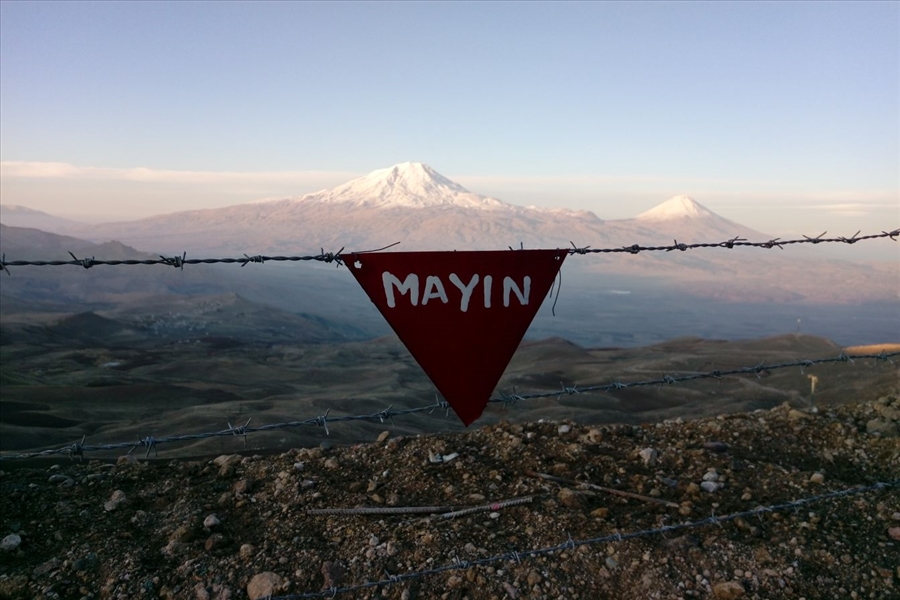Vision
To turn Türkiye into a country free from landmines and unexploded ordnance, with its people living without exposure to the risk of mine and / or unexploded ordnance.
Mission
To achieve all mine and / or unexploded ordnance cleaning activities for humanitarian purposes within the borders of Türkiye to be carried out safely and effectively in accordance with national and international standards, without the time and cost pressures.
Turkish Mine Action Center Announcements/News
Frequently Asked Questions
-
It describes the removing of the presence or suspicion of mines/unexploded ordnance from the contaminated areas to be used for various purposes (agriculture, animal husbandry, industry, public investment etc.) prioritizing the lives of the workers and the third persons without the pressure of time and costs, destruction of mine stockpiles, offering mine and unexploded ordnance risk education, giving of assistance to mine victims, and all the anti-mine actions. By conducting mine actions, keeping of our citizens away from the risks, increasing their awareness on the risks of mines, and clearance of motherland (from metal and chemical etc. materials) are aimed at.
-
Majority of the activities directed at demining and unexploded ordnance clearance are conducted by the elements affiliated to the Ministry of National Defence and Ministry of Internal Affairs. Aside from these activities, within the context of “Socio-economic Development through Demining and Increasing the Border Surveillance Capacity at the Eastern Borders of Türkiye” [EBMCP] funded by the budget received from the European Union Instrument for pre-Accession Assistance (EU-IPA) and supported by contributions taken from the National Budget, demining actions and non-technical Survey action are being conducted. In order to be able to accomplish secure and effective mine actions in Türkiye, National Mine Action Standards [MMFS] and National Mine Action Standard Operational Procedures [MMFSUT] have been produced along the lines of International Mine Action Standards (IMAS). Information Management System for Mine Action (IMSMA), founded within the organization of Turkish National Mine Action Center, records all the phases of mine actions and owing to the data flow obtained the activities carried out in the field are managed. An institutional capacity is reached within the organization of the Turkish National Mine Action Center, which has displayed a rapid progress since its foundation. Contributions are made to the continuing mine actions in the friendly and brotherly countries. In the researches aimed at pursuing mine actions through domestic and national means, and to meet the requirements of the Turkish Armed Forces, a contribution was made to the development of Mechanical Mine Clearance Equipment [MEMATT] in cooperation with the ASFAT S.A. Having passed the performance, survival, and field acceptance tests conducted by the Turkish National Mine Action Center, and accredited by the same institution, it has become a defense product arousing interest in the international market. Consequently, the Mechanical Mine Clearance Equipment [MEMATT] was exported to Azerbaijan, Burkina Faso, and Togo, struggling with demining and clearing of unexploded ordnance operations, and efforts are being spent to export it to other friendly countries. Moreover, numerous domestic firms are manufacturing equipment and detectors used in mine actions. Although efforts are being made on the issue of demining and clearing unexploded ordnance through national means, accreditation of our domestic firms and their continuing their mine actions in the international arena is sought.
-
Through conducting humanitarian demining actions in our country our land will be cleaned of primitive means of defense – the mines; and by constructing modular walls in cooperation with our institutions along our borders aiming at stopping the illegal immigrations, and by the introduction of intensely technological and humanitarian Integrated Physical Border Security System – an advanced humanitarian security system based on leading-edge technology backed with armored vehicles and smart watchtowers – Turkish borders will effectively be protected. Clearance of the unexploded ordnance in contaminated areas will be to the benefit of agriculture, industry, and to that of public investment etc.
-
Anti-personnel land mines were first planted along the Turkish-Syrian border as of 1956 as a defensive strategy to provide security during the Cold War Era, and to prevent smuggling; and were planted between the years 1993-1997, owing to the ever intensifying terrorist activities, to secure the military installations in the Eastern and Southeastern Anatolia, and to strengthen the security of our borders. Unexploded ordnance contaminated areas are the lands which the security forces used for training/exercise purposes in the past, now fallen into disuse, and which are deemed to be advantageous for social and economic purposes following unexploded ordnance clearance. All those areas threaten our citizens and natural habitat, and chemically contaminate our motherland.
-
The existence of mine and unexploded ordnance contaminated areas in our country, aside from threatening security of life, exposes Türkiye to the pressures of international arena and brings along numerous domestic problems. Within this framework; (1) Mines, planted for border security and against the threat of terror, threatens the safety of life and property of the local people dealing with farming and animal husbandry, (2) Mine and unexploded ordnance contaminated areas impede the activities to be held in the regions of our historical treasures and obstructs those areas from becoming parts of our cultural heritage, and prevents the benefits to be obtained from other uses of those areas, (3) Contaminated areas within the National/Natural Parks threaten the wild life, (4) Contaminated areas, being surrounded by residential districts in time, impede the urbanization of the region and obstructs its economic development, (5) Mine contamination in the regions to be subjected to subsurface exploration and seismic researches obstructs the integration of our rich underground sources (oil, natural gas etc.) into our country’s economy, and impedes our endeavors to minimize our dependence on foreign resources, (6) Mine contamination in the regions suitable for the construction of Power stations (Wind Power Plant, Solar Power Plant etc.), impeding the investments, obstructs the use of national resources in energy production, (7) Failing in completing the demining and unexploded ordnance clearance actions in the areas falling out of military use obstructs mining activities – ranging from exploration, to operation and to quantity surveys – from contributing to national economy.
-
Mined zones were set up on the Turkish-Syrian border, between the years 1956 and 1961, as a defensive strategy to provide security during the Cold War Era, and to prevent smuggling. As mines fell into disuse owing to natural occurrences (wild fires, floods, inundations, landslide etc.) since then, and their being primitive means of defense incapable of meeting today’s border security functions/standards, demining of mined zones and founding of Integrated Physical Border Security Systems have been decided. Our country declared its first intention in clearance of the mines fallen into disuse and in eradicating the mine question in 1996; moreover, it bears the responsibility of its intention within the context of “The Convention on the Prohibition of the Use, Stockpiling, Production and Transfer of Anti-Personnel Mines and on their Destruction” (Ottawa Convention). Within the context of the Law 5903, “Law on Mine Clearance Activities and Tender Processes along the Land Border between the Republic of Türkiye and the Syrian Arab Republic,” issued in 2009, a mine clearance project to be realized by private firms was designed. Nevertheless, the project was cancelled on 17 June 2013 owing to the political instability in Türkiye’s neighboring geography. Limited to the area along the concrete modular wall construction, as a part of stream improvement projects, agricultural land development projects, and Physical Border Security System Projects, mine clearance actions are being conducted by the Special Mine Search and Destruction Teams [ÖMAT] affiliated to the Ministry of National Defence. All of the minefields set up between the years 1956 and 1961 on the Turkish-Syrian borderline have the status of prohibited military zone and are currently posing an active danger. As stated above, the mined zones on the Turkish-Syrian border are still being detected. Demined zones are made use of by the relevant ministries. No part of the cleared zones was handed over to any entity that poses a threat to our national interests.







